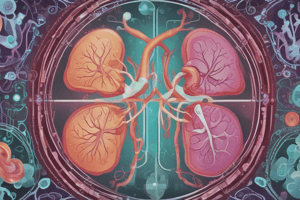Podcast
Questions and Answers
Apa penyebab utama gagal ginjal kronis?
Apa penyebab utama gagal ginjal kronis?
- Kanker
- Diabetes (correct)
- Gagal jantung
- Tekanan darah tinggi
Apa yang dapat menyebabkan cedera ginjal akut?
Apa yang dapat menyebabkan cedera ginjal akut?
- Infeksi
- Trauma
- Tumor
- Semua di atas (correct)
Apa yang dinilai dalam tes darah untuk mendiagnosis gagal ginjal?
Apa yang dinilai dalam tes darah untuk mendiagnosis gagal ginjal?
- Kadar gula darah
- Kadar lemak darah
- Kadar kreatinin dan nitrogen urea darah (correct)
- Kadar hemoglobin
Apa yang dapat membantu mengobati gagal ginjal?
Apa yang dapat membantu mengobati gagal ginjal?
Apa yang dilakukan dalam prosedur hemodialisis?
Apa yang dilakukan dalam prosedur hemodialisis?
Apa yang dapat menyebabkan obstruksi saluran kemih?
Apa yang dapat menyebabkan obstruksi saluran kemih?
Apa yang dinilai dalam analisis urin untuk mendiagnosis gagal ginjal?
Apa yang dinilai dalam analisis urin untuk mendiagnosis gagal ginjal?
Apa yang dapat membantu mendiagnosis penyakit ginjal?
Apa yang dapat membantu mendiagnosis penyakit ginjal?
Apa yang dilakukan dalam prosedur peritoneal dialisis?
Apa yang dilakukan dalam prosedur peritoneal dialisis?
Apa yang dapat membantu mengobati anemia pada gagal ginjal?
Apa yang dapat membantu mengobati anemia pada gagal ginjal?
Flashcards are hidden until you start studying
Study Notes
Causes of Kidney Failure
- Chronic kidney disease: Diabetes, high blood pressure, and family history are common risk factors.
- Acute kidney injury: Sudden damage to kidneys due to trauma, infection, or medication.
- Obstruction: Blockage in the urinary tract, such as kidney stones or tumors.
- Vascular disease: Reduced blood flow to the kidneys due to heart disease or atherosclerosis.
- Toxins: Exposure to heavy metals, solvents, or certain medications.
Diagnosis of Kidney Failure
- Blood tests: Evaluate kidney function through creatinine and blood urea nitrogen (BUN) levels.
- Urine tests: Analyze protein, blood, and other substances in the urine.
- Imaging tests: Ultrasound, CT, or MRI scans to visualize kidney structure and function.
- Biopsy: Tissue sample examination to determine kidney damage.
Treatment of Kidney Failure
- Medications: Control underlying conditions, such as diabetes, high blood pressure, and anemia.
- Lifestyle changes: Dietary modifications, fluid restriction, and stress management.
- Transplantation: Surgical replacement of a diseased kidney with a healthy one.
- Dialysis: Artificial filtration of waste products from the blood.
Dialysis
- Hemodialysis: Blood is filtered outside the body using a machine.
- Peritoneal dialysis: Waste products are removed from the blood through the abdominal cavity.
- Continuous renal replacement therapy: Slow, continuous dialysis for critically ill patients.
Symptoms of Kidney Failure
- Fatigue: Weakness and lack of energy due to anemia and waste buildup.
- Swelling: Fluid retention in the legs, ankles, and feet.
- Nausea and vomiting: Waste product accumulation in the blood.
- Itching and skin rash: Electrolyte imbalance and waste buildup.
- Pain: Back pain and flank pain due to kidney damage.
- Changes in urination: Decreased urine output, difficulty urinating, or frequent urination.
Studying That Suits You
Use AI to generate personalized quizzes and flashcards to suit your learning preferences.



